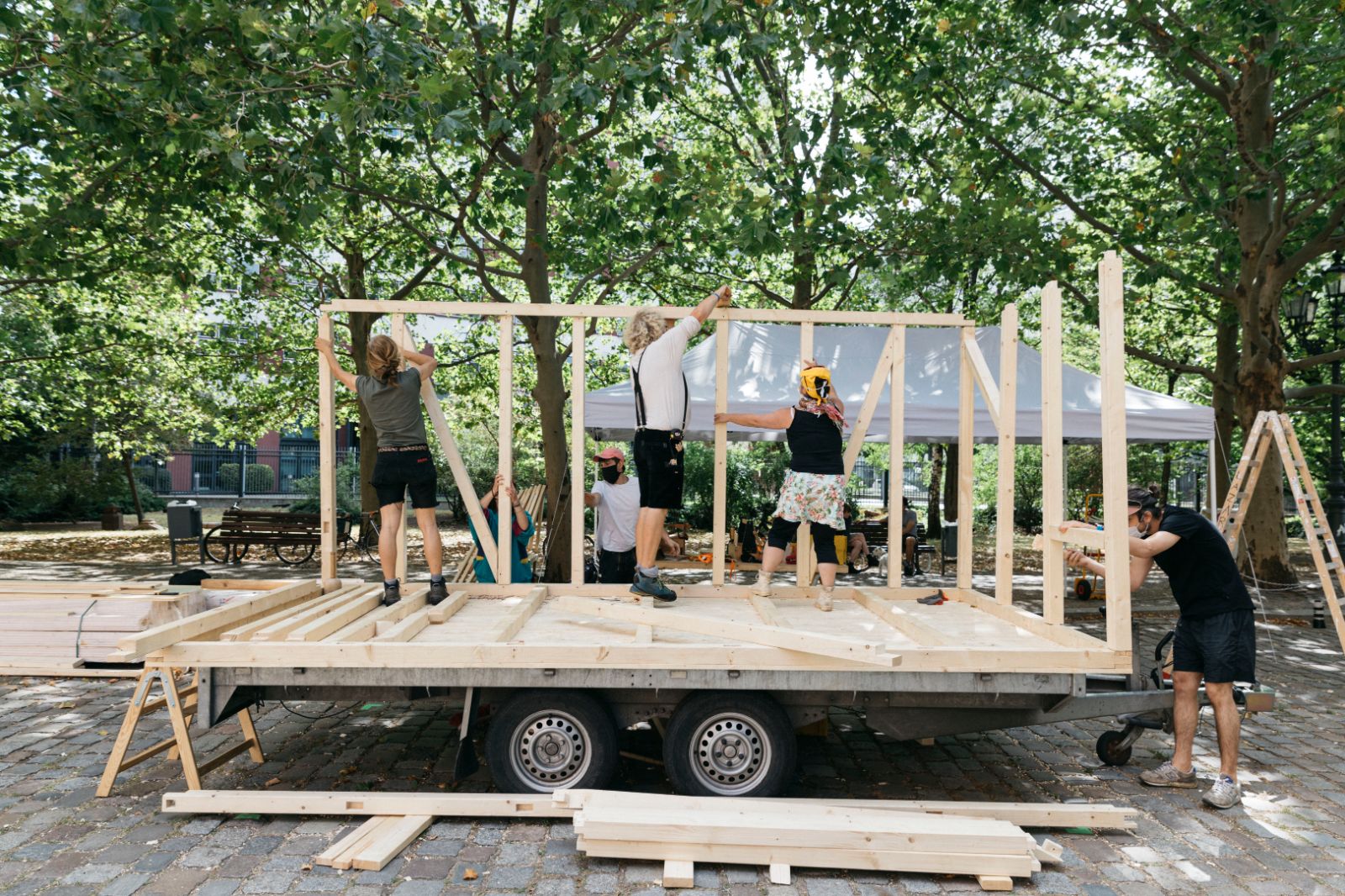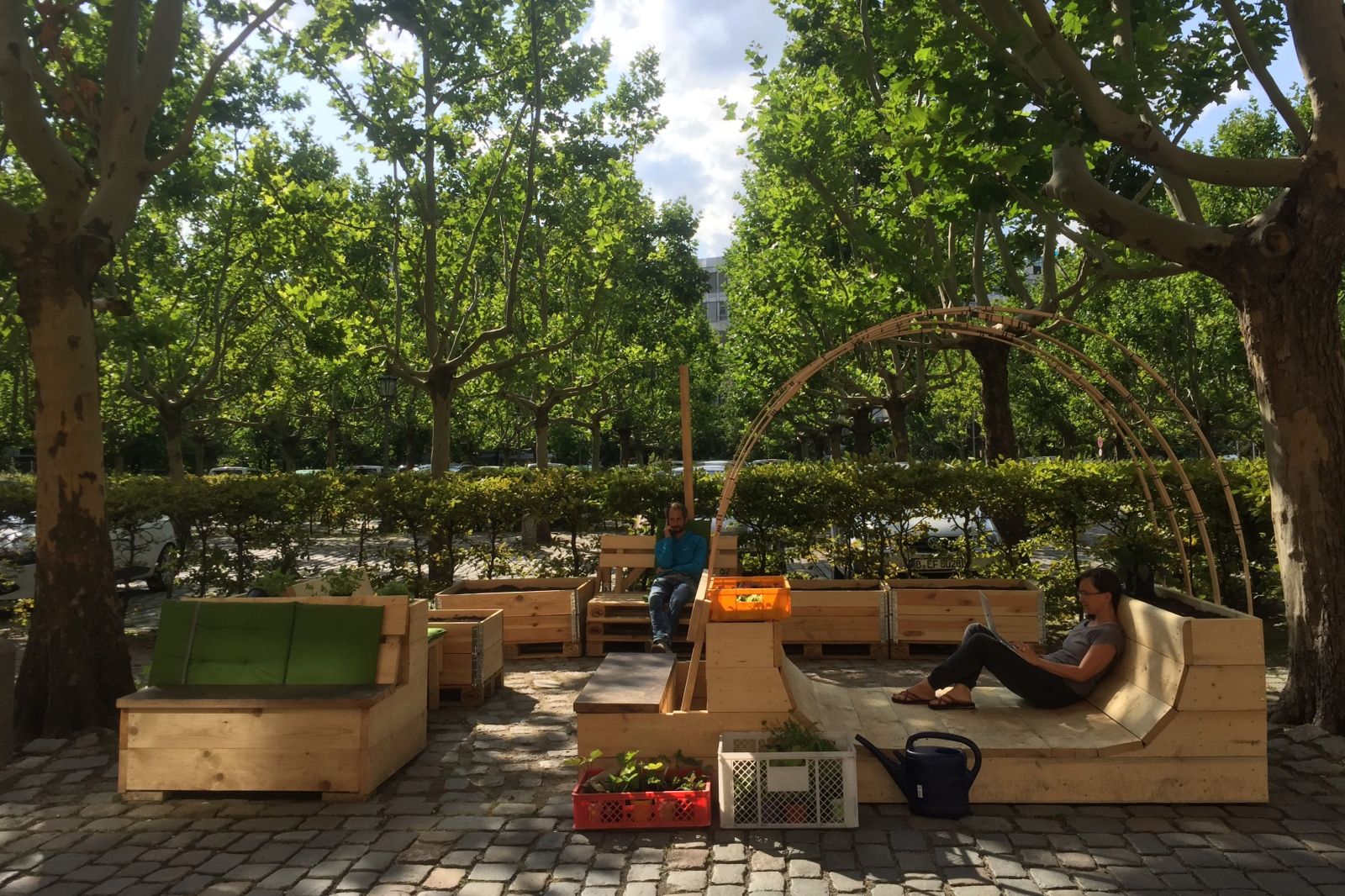Christoph Hügelmeyer
Technical Director and Environment Management Officer
Prompted by an initiative for sustainability and culture: Between 2010 and 2012, the Federal Cultural Foundation (Kulturstiftung des Bundes) carried out the project Über Lebenskunst in cooperation with Haus der Kulturen der Welt. As part of the eponymous festival, in 2011 artists, scholars and activists presented reflections on the topic of climate change and invited people to try out sustainable models of an “art of living” for the 21st century. What can “the good life” mean in the face of the global ecological crisis? The initiative project, which sought to anchor long-standing sustainability debates more firmly in culture, became the starting point for KBB’s engagement with ecological sustainability.
Together with staff, KBB has since been exploring the possibilities that a cultural institution offers as a place for forward-looking ideas in environmental protection. This is not only about making sustainability discourses communicable in our programmatic mission, but also about the potential of culture to drive overarching change in society.
As a basis for this process, KBB has been using the international Eco-Management and Audit Scheme (EMAS) since 2013 to assess its own environmental impact and ascertain tangible figures – whether gauging water consumption in the individual buildings, conducting material flow analyses or measuring the kilowatt hours consumed for heating and spotlights.
The KBB GmbH and the Berliner Festspiele are jointly developing an energy-saving mode for their websites. This function can be activated by a button on the header. Firstly, it will set the site to dark mode, so that your device uses less energy to illuminate its screen. Secondly, it will also display placeholders in place of embedded images and videos. This has the effect that fewer data have to be loaded in the background so that the website will load faster even at a lower data rate. This does not apply to our festival-specific vector graphics as these take up very little memory anyway. In order to be able to view media content marked by placeholders, energy-saving mode can simply be switched off temporarily.
Developed by the European Union, the international Eco-Management with Audit Scheme (EMAS) supports businesses in making an effective contribution to environmental protection. KBB has been aligning its environmental management with EMAS since 2013 and is continuously working on improving its own environmental impact.
EMAS works from the inside out by being woven into the DNA of the company: The basis of the system is the commitment and involvement of KBB employees. As an environmental team, they discuss data collected and, based on this, formulate annual measures for climate protection and resource conservation. EMAS supports and coordinates the efforts by regularly advancing the set goals through internal and external audits. In this way, the implementation of the self-selected measures is ensured and communicated internally and externally. The EMAS validation creates the necessary framework conditions to anchor environmental education in the institution and to sustainably change structures and processes.
On 24 November 2021, KBB received confirmation from the Chamber of Industry and Commerce that it can continue to hold the EMAS certificate for ecological management with registration number DE-107-00140 until at least 1 October 2024.
“I like being part of the environmental team because I firmly believe that some things need to change in the festival sector. These changes don’t automatically mean making sacrifices; they can be fun and that’s what I’m up for!”
Katharina Fritzsche, Head of Project Coordination, Berliner Festspiele


How can we as cultural organisers act more sustainably and contribute to a fundamental rethinking of the cultural sector? Instead of forgoing the arts, we rely on technical knowledge, creativity and innovation. As far as artistic processes allow, ecological aspects are taken into account in the planning, realisation and follow-up of our events, especially in the areas of resource use, procurement, business travel, transport and waste disposal. For example, stage exhibits are re-used by means of a cross-house materials market, edition sizes are reduced and guidelines for environmentally friendly event organisation are developed. Our goal is to create an all-encompassing awareness for environmentally friendly action and our own responsibility by pointing out alternatives.
Example measures:
How can exhibition spaces and stage venues reduce their CO2 emissions in the long term? Since the introduction of environmental management, KBB has continuously recorded the consumption data for heat, electricity, water, waste and certain consumer products as well as the resulting CO2 emissions for each location of its institutions. Their evaluation forms the basis for setting up optimising measures. The technical and energy refurbishment of KBB’s venues and the switch to green electricity, which was completed in 2013, mark important milestones in the environmentally conscious administration and use of the buildings. In close exchange with allies, social responsibility also plays a major role when energy consumption has to be reduced due to rising costs and possible bottlenecks.
Example measures:
KBB has agreed with its employees to make business trips as climate-neutral as possible. For this reason, KBB only reimburses travel by public transport within Berlin. Rail is also the preferred mode of travel within Germany and to major European cities in neighbouring countries. Long-term employees have the option of purchasing the BVG (Berlin public transport) company ticket. In addition, KBB is gradually converting its vehicle fleet, necessary for its operations, to electric vehicles.
Example measures:
All those who produce, create and consume have to make decisions on sustainability. Therefore, it is of particular concern to KBB to involve the employees of all venues in the ecological orientation in order to accompany KBB as a company on its way to an ecological future. The employees of KBB are therefore invited to regular environmental team meetings in order to actively participate in the transformation process and to contribute their own ideas. Training and information on environmentally conscious behaviour at the workplace as well as joint excursions additionally strengthen awareness of ecological sustainability, while the members of the environmental team are always available as contact persons.
Example measures:
KBB supports the rewetting of moors in northern Germany by purchasing MoorFutures to cover unavoidable air travel by employees. MoorFutures is dedicated to the renaturation of peatlands in Brandenburg, Mecklenburg-Western Pomerania and Schleswig-Holstein. Powerful carbon reservoirs, peatlands bind about one third of the carbon existing in the earth’s soil and biomass while covering only three percent of our planet. By purchasing voluntary climate protection certificates, KBB supports MoorFutures in its work to re-wet drained peatlands and thus permanently bind CO2 in the soil. The KBB funds are used for the rewetting of former moors. You can find out more at www.moorfutures-sh.de or here.
Christoph Hügelmeyer
Technical Director and Environment Management Officer